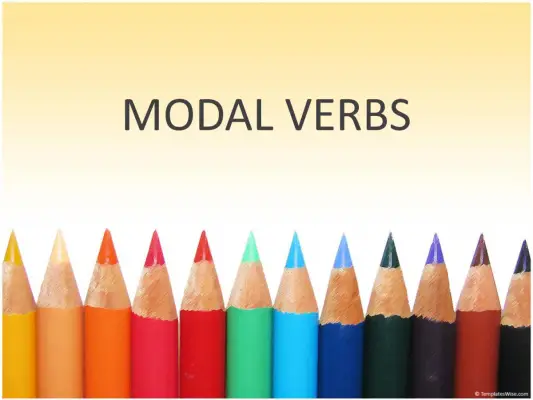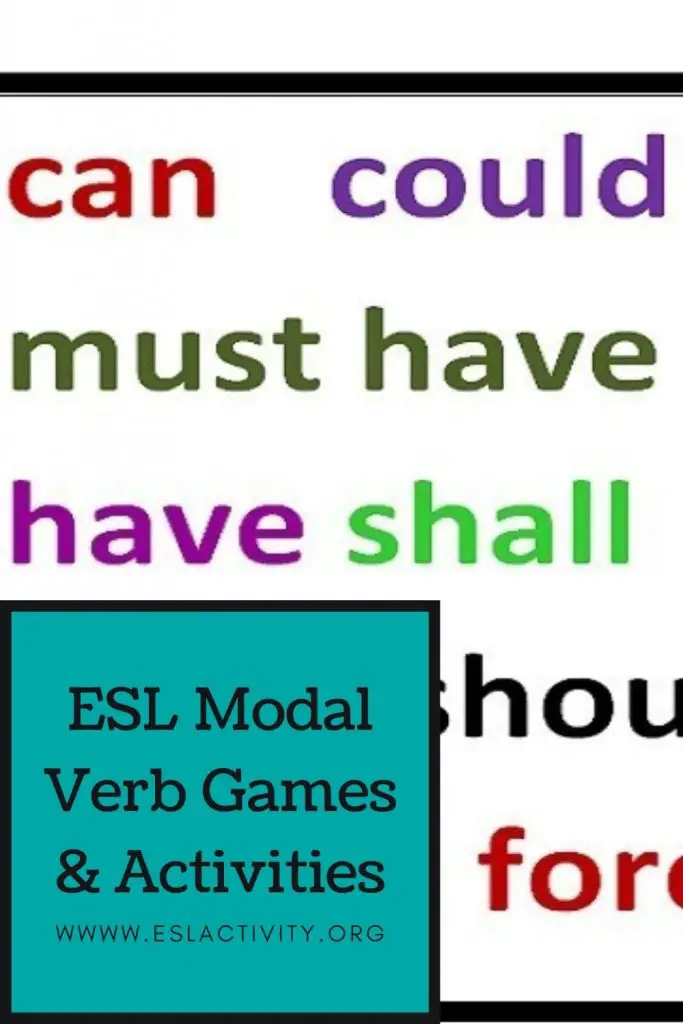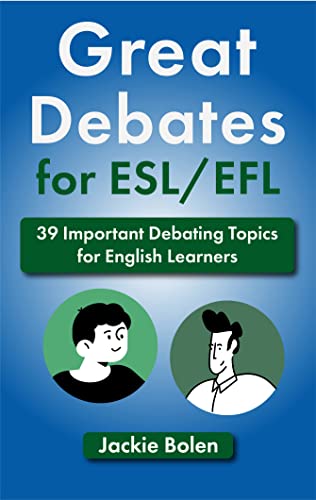If you’re looking for some modal verb activities, games, worksheets or lesson plans, then you’re certainly in the right place. Find out all of our tips and tricks for teaching modal verbs the awesome way. Modals activity: here we go!

Modal verb games and activities
Let’s get into all the modals games and all the tips and tricks you need for teaching modals. Keep on reading for everything modal verbs games!
Modal Verbs Activities and Games
Are you ready to get into the best activities for modal verbs, an important ESL part of speech concept? Then here are the top 15 picks for modals ESL.
#1: ESL Surveys for Ability
I LOVE to use surveys in my classes. Ask my students and they’d probably tell you the same thing! One area that they work especially well is with modal verbs, particularly can and can’t for ability. You can fill the survey sheet with lots of questions like the following:
- Can you play a musical instrument?
- Can you play tennis well?
- Etc.
Then, students have to go around the class talking to their classmates to find someone who answers yes to that question. Then, they have to ask a follow-up question.
Do you want to try out this 4-skills ESL activity? More details here: Surveys for English Learners.
#2: Which Job Is It?
In this guessing game, students think of a secret job. Then, they have to write down a few hints using the following modal verbs:
- Have to
- Don’t have to
- Needn’t
- Mustn’t
Working with a partner, they can tell them the hints and their partner can guess the job. You can repeat the process 2-3 times with a different partner.
- Amazon Kindle Edition
- Bolen, Jackie (Author)
- English (Publication Language)
- 187 Pages - 03/09/2016 (Publication Date)
#3: 2 Truths and a Lie
Most teachers use this activity as a kind of icebreaker but it also fits very well with modals for ability or skill. For example:
- I can make homemade kimchi.
- I can run for a really long time without stopping.
- I can study for 6 hours without taking a break.
Two are true but the other one is false. Students have to grill me with questions for 2-3 minutes to find out which! Then, students take turns playing with each other. Try out one of the best modals activity.
#4: Find Someone Who Bingo for Modal Verbs of Ability
This find someone who bingo game makes an excellent icebreaker but you can easily adapt it to work on modal verbs of ability. The way it works is that students have to fill in their bingo cards with selections from a list of skills or abilities. For example: play soccer well, cook something delicious, drive a car, etc.
Then, they have to walk around the class talking to their classmates to find someone who can do each thing. Do you want to know more about this ESL speaking activity? Check out all the details here:
- Amazon Kindle Edition
- Bolen, Jackie (Author)
- English (Publication Language)
- 116 Pages - 02/02/2020 (Publication Date)
#5: Agony Aunt Advice Activity
One area where a ton of modal verbs are used is in giving advice (should/shouldn’t/ought to, etc.). One of my favourite activities for this is Agony Aunt. It’s fun, challenging and totally relatable as long as you choose an appropriate problem.
Do you want to find out more about it? You can check out one of the best modal verbs conversation activities here: Agony Aunt ESL Advice Activity.
#6: Modal Board Game
#7: Prove It with Modals for Ability
Students can help you think of a list of physical challenges that are not that easy to do. For example:
- Can you pat your head and rub your stomach at the same time?
- Can you do a headstand?
- Can you do 20 pushups?
Then, students have to choose 3 of the skills and write them down on a piece of paper. After that, they have to walk around the class to find a classmate who can do it. If the classmate says that they can, they have to prove it!
#8: Modal Verbs Songs and Chants
Songs are a super fun way to make English more memorable. You’ll find lots of options over on YouTube for both kids as well as adults.
#9: Typhoon Game
A nice way to review just about anything, including modal verbs is with the typhoon game. It works for all ages! It makes a nice modal verbs speaking activity.
#10: Can/Can’t Secret Thing Game
When you’re teaching about can and can’t for ability, you’ll want to try out this fun game. The way it works is that students think of a secret thing according to a certain topic. Animals for example and then write three hints about it using can, starting from general to more specific. For example:
- It can eat leaves.
- In Korea, you can only see it in the zoo.
- It can easily see over tall things.
The answers is giraffe! But, you can collect these papers from the students and play a game. More details here: Can/Can’t ESL Game.
#11: English Class Rules and Modal Verbs
Tell students that this is their big opportunity to have a say about English class! Working in groups, they can make a list of 10 rules for your English class. Some can be serious like students must bring their textbooks, but others can be silly.
#12: It’s the Law (Permission and Prohibition Modals)
In this activity, students think about using can for permission and can’t for prohibition. In groups of 2-3, students have to think of at least 5 laws in their home country. For example:
- You can’t drink until 19.
- You can drive with your parents at 16.
When this is complete, elicit some answers and briefly discuss them as a class. Then, students can talk together about any changes they would make if they were in charge and why.
- Amazon Kindle Edition
- Bolen, Jackie (Author)
- English (Publication Language)
- 114 Pages - 05/30/2015 (Publication Date)
#13: Sentence Structure Activities
With modals, there is certainly some care that needs to be taken with sentence structure and how it all fits together. To help your students work on this important skill, you’ll want to check out the following resource:
ESL Sentence Structure Activities.
#14: Hot Potato
#15: Obligation Activity
If you want to do a certain job well, there are of course certain requirements. For example, if you want to be an Olympic athlete, you:
- must start at a young age.
- must train almost every day.
- mustn’t eat lots of junk food.
- must have a source of funding
- must have a coach.
Put students into groups and assign each of them a job, or they can choose their own. Then, they have to make at least 5 sentences. Finally, each group can join with another group and give hints about their job. The other team can guess what it is. Or, the entire class can guess the job.
#16: Vocabulary Auction
Try out this fun game that’s ideal for a modal verbs speaking and reading activity.
#17: Modal Verbs Videos
Instead of me always talking up at the front of the class, I like to mix things up sometimes and have another teacher give the information! In this case, YouTube is some serious gold. Besides a quick lecture, there are a ton of others kinds of videos for any grammar point, vocabulary set or topic. Just have a look and you’ll find the ESL teaching awesome.
This can lead into some excellent modal verb conversations!
#18: Running Dictation
Try out one of my favourite activities for modals.
#19: Job Interview for Abilities and Skills
Students can take turns interviewing each other. They can start with easy questions like, “Can you type?” and then get into more difficult questions like, “Can you write an email in English with no errors?”
It’s just for fun so encourage difficult questions.
#20: Would you Do That?
Students make a list of 10 things, 5 of them are things they would do and 5 are things they wouldn’t do. For example:
- I would go sky diving.
- I would eat an entire pizza if my mom didn’t stop me.
- Etc.
Use would for all the statements. Then, put students into pairs and the partner has to decide which statements are things their partner would actually do and which ones are things they wouldn’t do.
#21: Dialogue Substitution
#22: Timelines and Flowcharts
Have students create timelines or flowcharts to visually represent a sequence of events. This can be done individually or in groups. They should label each step or event using sequence words to demonstrate the order of occurrence.
#23: Guided Reading
Provide texts or passages that contain sequence words, such as procedural texts, historical accounts, or narratives. Have students read the text and identify the sequence of words used to describe the order of events. Discuss how the sequence words contribute to the overall understanding of the text.
#24: Listening and Comprehension Exercises
Use audio or video clips that involve a series of events or steps. Students listen or watch carefully and write down the sequence words they hear or observe. This activity enhances listening skills while reinforcing the use of appropriate sequencing vocabulary.
#25: Role-Play Scenarios
Assign students different roles in a role-play scenario and provide them with a sequence of events to act out. They must use sequence words to guide the flow of the role-play and ensure that the events occur in the correct order. This is one of my favourite modal verbs speaking activities.
#26: Sentence Scrambles
Create sentence scrambles where students rearrange words or phrases to form coherent sentences using sequence words. This activity helps students practice identifying and using appropriate sequencing vocabulary.
#27: Real-Life Application
Encourage students to use sequence words in their daily life conversations and interactions. For example, they can describe the steps of a recipe, recount their weekend activities, or explain a process they followed.
#28: Verb List in English
If your students want to learn the most common English verbs, have a look at this list:
#29: Modals Dice Game
Create a dice with different modal verbs (can, could, may, might, must, shall, should, will, would) on each side. Students roll the dice and make a sentence using the modal verb that comes up.
#30: Modal Verb Debates
- Amazon Kindle Edition
- Bolen, Jackie (Author)
- English (Publication Language)
- 154 Pages - 01/03/2023 (Publication Date)
Assign students different viewpoints on a topic and have them debate using modal verbs to express possibility, necessity, or ability.
ESL Modals FAQs
There are a number of common questions that people have about modal verbs ESL. Here are the answers to some of the most popular ones.
What is a modal verb?
Modal verbs are used to show if something is certain, possible or impossible. For example:
- It will rain tomorrow.
- It can’t be her coat.
Modals can also be used for ability, permission or making requests and offers or when asking for help. For example:
- I can play tennis.
- Can I take this book home with me?
- I can help you with your car.
You’ll also find them used for suggestions or obligations. For example:
- You should stop smoking.
- He must train tonight.
Where’s a list of modal verbs?
Here’s a list of modal verbs:
- can
- may
- must
- shall
- will
- could
- might
- should
- would
These modals can also be made into a negative form.
What are some modal verb TEFL activities?
What is a modal verb example?
A modal verb is an auxiliary or helping verb such as can, will, could, shall, might, should. They add meaning to the main verb of the sentence and express things like permission, obligation, ability, etc. Here are some modal verb examples:
- I can play soccer well.
- He might not be able to come to the party.
- They should help their sister.
What are prohibition modals examples?
Prohibition modals are used to express that something is not allowed or is prohibited. Here are some examples of prohibition modals:
- Must not: You must not smoke in this area.
- Cannot: You cannot enter without a valid ID.
- Should not: You should not speak during the exam.
May not: Visitors may not take photographs inside the museum. - Are not allowed to: Students are not allowed to use cell phones in class.
- Is not permitted to: Camping is not permitted in this park.
- Must never: You must never reveal your password to anyone.
- Have to avoid: You have to avoid parking in the fire zone.
- It’s against the rules to: It’s against the rules to drink alcohol in this public park.
- No one is to: No one is to leave the building during the fire drill.
How do modals help students?
Understanding modals can be of significant help to all students who are learning English and even beginners learn how to use them. For example, using can or can’t to express ability (I can play tennis but I can’t play soccer). Modal verbs have a large variety of functions in the English language.
How do you introduce Modals?
Introduce modals in a lesson in the same way that you would any grammatical concept or vocabulary set. First, set the context (this is key when taking into account Cognitive Load Theory) and then introduce modals through either a listening or reading passage. Then, do some explicit teaching and have students do some controlled and then freer practice.
What are some fun games to teach modal verbs with?
Model Verb Worksheets
There’s certainly no need to reinvent the English teaching wheel! A ton of teachers have gone before us and created lots of solid modal verb worksheets. Just print and go and you’ll be able to save yourself a ton of time. Here are some of the best options:
Online Practice for Modal Verbs
If you want to give your students some additional practise with modals, then you’ll want to consider some online practice and games. Here are some of our recommendations:
Modal Verb Lesson Plans
Do you want to find a solid lesson plan for modals instead of creating your own? Who doesn’t, right? It can save busy teachers a ton of time to just print off something and go. If that’s exactly what you’re looking for, we have some good news for you.Here are our top picks for modal verb ESL lesson plans:
You might also want to plan your own. Here’s the easy way to do that:
What are Some Tips for Teaching Modal Verbs?
Teaching modal verbs to English learners can be made easier with the following tips:
Start with the basics
Begin by introducing the concept of modal verbs and their function. Explain that modal verbs are auxiliary verbs that express abilities, possibilities, permissions, obligations, and advice.
Teach one modal verb at a time
Focus on one modal verb at a time to avoid overwhelming learners. Start with commonly used modals like ‘can,’ ‘should,’ or ‘must.’ Provide clear explanations, examples, and usage rules for each modal verb.
Use real-life examples
Incorporate practical and relatable examples in your teaching to demonstrate the use of modal verbs in different contexts. Show how modals are used in everyday conversations, giving learners a better understanding of their meaning and usage.
Provide visual aids
Visual aids such as charts, diagrams, or infographics can help learners grasp the concepts more easily. Use visuals to illustrate the meanings and uses of modal verbs, as well as their sentence structures.
Focus on usage and meaning
Help learners understand the nuances of modal verbs by highlighting their specific meanings and how they convey different levels of certainty, obligation, or permission. Provide examples to demonstrate the differences between similar modal verbs, such as ‘can’ and ‘could,’ or ‘should’ and ‘must.’
Practice with meaningful activities
Engage learners in various activities to practice using modal verbs in context. These can include role-plays, discussions, debates, or writing prompts. Encourage learners to express their opinions, make requests, give advice, or describe abilities using modal verbs.
Offer ample practice opportunities
Provide learners with plenty of exercises and practice opportunities to reinforce their understanding of modal verbs. Use worksheets, online quizzes, or interactive games that focus on the targeted modal verb and its specific usage.
Correct and provide feedback
When learners use modal verbs, provide constructive feedback to help them improve. Correct any errors and explain the correct usage or alternative forms when necessary. Encourage learners to use modal verbs accurately and naturally in their communication.
Gradually introduce more modal verbs
Once learners have grasped the basics of one modal verb, introduce additional modal verbs over time. As they gain confidence and understanding, they can learn about the differences between ‘may,’ ‘might,’ ‘shall,’ ‘would,’ and others.
Encourage practice outside the classroom
Suggest resources, such as online articles, videos, or podcasts, where learners can encounter modal verbs in real-world contexts. Encourage them to practice using modal verbs in their everyday conversations or writing.
Conversation With Modal Verbs Example
Here’s a short conversation using modal verbs:
Alex: Can I borrow your car for a couple of hours? I need to run some errands.
Liz: You may borrow it, but you must be back by 5 PM. I have plans later.
Alex: Thanks, I promise I’ll return it on time.
Liz: You should also be careful while driving, and don’t forget to fill up the tank if it’s low.
Alex: I will, and I won’t speed. Thanks for letting me use your car!
Liz: No problem, just be responsible, and have a safe trip.
Did you Like these Modal Verbs Games?
- Amazon Kindle Edition
- Bolen, Jackie (Author)
- English (Publication Language)
- 112 Pages - 10/24/2019 (Publication Date)
Yes? Thought so! Then you’re going to love this book that you can find over on Amazon: 39 No-Prep/Low-Prep ESL Grammar Activities. The key to better English classes for kids, teenagers or adults is a wide variety of engaging and interesting activities. This book will definitely help you get through an entire semester of English grammar teaching in style!
Does it sound like what you might need? It probably is if you want to level up your teaching game. You can find the book in both digital or print formats. Keep a copy in the teacher’s room at your school or on your phone to serious lesson planning sessions. It really is that easy.
Pick up a copy of 39 ESL Grammar Activities for yourself on Amazon, but only if you want a serious dose of ESL teaching awesome in your life:
Have your Say about Modal Verb Activities
What are your thoughts about these modal verbs activities and games for ESL? Did you try out one of the activities from this list or do you have another that you’d like to recommend? Leave a comment below and let us know what you think. We’d love to hear from you.
Also be sure to give this article a share on Facebook, Pinterest, or Twitter. It’ll help other busy teachers, like yourself find this useful teaching resource.

Modals games
Last update on 2022-07-17 / Affiliate links / Images from Amazon Product Advertising API










